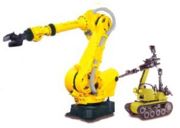Main Page
 Welcome to AdCiv.org :: Advanced Civilisation through 'Post-Scarcity' :: Post-Scarcity through Open Design and Advanced Automation We are nowhere near the height of human civilisation.
Not even close. Our present culture is conditioned by centuries of scarcity that ought to have disappeared by now, considering our technical capabilities. However, automation is advancing rapidly, and in parallel, we are developing ever more effective ways of collaborating and openly sharing knowledge. This means it will become increasingly unacceptable to let needless scarcity continue in the face of what is possible. New thinking and tools are emerging that could change everything. Via the internet a new fluid grouping of minds is evolving that is adhoc, distributed and mutually sharing – a system that is potentially far more effective at problem-solving and creative technical development than anything that has come before. In some areas, notably software development and knowledge gathering, it is well under way – but this is just the beginning. These 'open' peer-to-peer activities are about to burst out into the physical world enabling us to do things both technologically and economically that have not previously been feasible. AdCiv.org is exploring the emerging possibilities, focusing on developing concepts that could take us to the next logical phase of civilisation – namely an ecologically sympathetic post-scarcity age where abundant resources, tools and knowledge could enable a unparalleled standard of living for the entire growing global population. It may sound far-fetched to the uninitiated but the technologies to enable this are developing rapidly, so you might want to prepare yourself... Open collaborative design involves applying principles from the remarkable free and open-source software movement that provides a powerful new way to design physical objects, machines and systems. All information involved in creating the object or system is made available on the Internet – such as text, drawings, photographs and 3D computer-aided design (CAD) models – so that other people can freely re-create it, or help contribute to its further evolution. It is essentially the same principle that is used to progress scientific knowledge, however in reality it is much more open and transparent than much of contemporary scientific research.
A core element of this development model is a principle called 'copyleft'  So what have we got to work with? Mankind's fundamental resources are material, energy, intelligence and information. In reality they are all so enormously abundant that it's incredible to think that there are people in this world who are still going without the basic human necessities.
In the past a lack of technology could be considered a significant cause of scarcity but that is certainly not a reason any more. Despite common perceptions, there is no actual lack of material or energy available to us. Emerging methods of co-operation and advanced automation have the potential to unlock these resources to provide a good standard of living in all parts of the world, while causing minimal harm to the natural environment - a combination that although is hard to imagine today and might appear at first glance to be contradictory, is very much possible. An important trend in technological progress is the tendency of products and processes to steadily become more effective while using less material and energy – i.e. doing more with less – something that Buckminster Fuller termed ephemeralization termed ephemeralization  . .  There really couldn't be anything more important to us than the survival of our own species. It means protecting ourselves and future generations. However we currently have all our eggs in one basket which is a precarious situation – we live on this single world while under the shadow of various apocolyptic threats, both man-made and natural, that could destroy our current civilisation and even wipe us out entirely. Ultimately we are extremely vulnerable. Asteroids, virulent disease, global war with advanced weapons – all are possible and we must protect our future.
We've come a long way and gained irreplaceable culture and knowledge in the last hundred thousand years or so, and it would be the most foolish thing in history to lose it at a time when we have the technology to do something about it. Far more likely than total annihilation of our species is the possibility of being knocked back to the Dark Ages. It is not just about surviving but having good prospects, opportunities and a rich environment to live in, and not messing things up for our descendants. It's quite tricky to have an advanced civilisation with no civilisation at all...
 Advanced automation here refers to sophisticated automated systems, ideally with the additional capability for self-maintenance and repair, mostly requiring little or no human interaction to operate, apart from top-level guidance. Not being reliant on human effort to scale, these systems would hugely magnify our capability for production and decouple human time and effort from industrial productivity, allowing us to create as much of anything that is needed, while releasing people from mindless labour. This situation will arise when automated harvesting of raw materials is combined with automated logistics (already commonplace), automated transport systems, robotic manufacturing and self-maintenance and repair, creating fully automated production of useful goods.
In Western countries many industrial process are becoming highly automated already, but human effort is needed for construction and commissioning as well as maintenance and repair. In developing nations, there is not much automation at all due to labour being so cheap; however this is a great waste of human lives. These self-repairing systems are based on technologies and knowledge that we already possess. No fictional concepts or unattainable artificial intelligence are required to make this happen. We have the ability today to create systems that provide for the global population's basic needs and far beyond, while minimising our impact on the environment – these two aspects are not mutually exclusive. The post-scarcity age is an anticipated era where advanced automated technology combined with efficient use of natural resources and effective co-operation could create a great abundance of the material items, goods and services required by a global population. As these highly automated processes continue to evolve, the results are likely to be achieved with ever diminishing harm to the environment.
Mankind's ever-increasing technical sophistication, will mean that people should not have to die or suffer unnecessarily due to a lack of basic necessities like food, clean water and medicine which is still the case in many parts of the world; and additionally humanity can undertake projects that were previously impossible or economically unfeasible. Additionally due to this physical abundance society may lose some of its obsessive preoccupation with material possessions, meaning it could become a post-materialistic era also. This is hard to see while sitting in the middle of the current consumer culture and is a debatable point, but even if people's taste for goods does not subside, old goods will be easily recycled into new. It has been promised for decades but the technology and culture to enable a true era of abundance could finally free people from working in jobs they have no particular interest to them except for the wage that it gives. People would be free to pursue their interests, learn and have far more time to be with the people who are important to them. Among other things like personal happiness, this is vital in restoring genuine communities and all the richness and support that gives to those living within it. The bigger picture being painted here may sound rather idealistic, but the enormously powerful enabling technologies and co-operative frameworks that make it possible need to be properly understood in order for this to make any sense...  This website is very much a work in progress so if you come across Keywords: advanced civilisation, advanced civilization, adciv.org |
 [print version]
[print version]  [update]
[update]  [site map]
[site map]Quick tour: next page 






